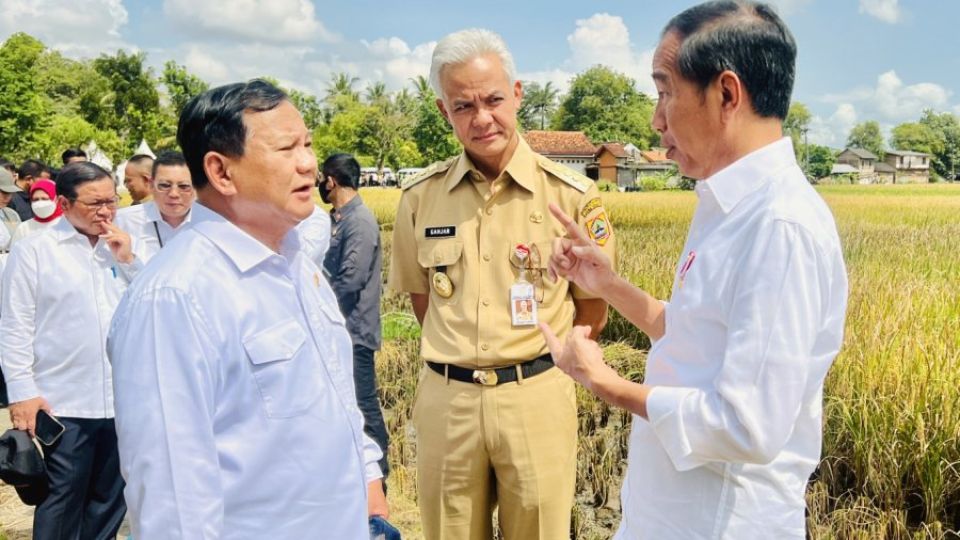May 29, 2023
JAKARTA – President Joko “Jokowi” Widodo’s consistent popularity through to his final year in office may pose a challenge for his own party the Indonesian Democratic Party of Struggle (PDI-P), the largest party in the ruling coalition, as he appears to keep his options in regard to his succession open while his supporters shift over to three-time presidential hopeful Prabowo Subianto.
Back with an approval rating of more than 70 percent in public opinion polls, an achievement that any final-term president in any democracy in the world would look on with envy, Jokowi has proven his critics wrong for thinking he would be leading a lame-duck presidency at this stage.
But even though he still has command over hundreds of thousands of die-hard supporters prepared to follow his lead, the astute businessman-turned-politician has kept everyone guessing over his choice of a successor for when he steps down.
Jokowi was present when the PDI-P officially nominated Central Java Governor Ganjar Pranowo as its presidential candidate, but he has not shown any indication of distancing himself, or his sons and supporter groups, from close ally Prabowo.
With Ganjar under immediate pressure to bounce back after the PDI-P’s decision to sabotage Indonesia’s chances of hosting a youth soccer world cup blew up in his face, Jokowi’s own ambivalence may not be helpful for Ganjar in his attempts to reclaim his spot at the top of opinion polls.
Even Ganjar’s surprise nomination, a decision which party executives say was reached by PDI-P chairwoman Megawati Soekarnoputri after consultations with the President, has not helped the governor reclaim a comfortable lead as many would have expected, analysts have noted.
A recent survey by the research arm of Kompas daily, the country’s most widely distributed newspaper, found that in a simulated three-horse race, Prabowo emerged at the top with 24.5 percent of 1,049 respondents favoring him, with Ganjar and opposition figure Anies Baswedan trailing behind with 22.8 and 13.6 percent, respectively.
A closer look at the survey, taken between April 29 and May 10, shows that while more than half of total respondents that supported Jokowi favored Ganjar over his potential rivals, this number has fallen by 4.7 percent to 56.3 percent from 61 percent in a similar poll conducted in January.
Citing a possible “serious threat” for Ganjar and his party, the survey also highlighted a bump in support for Prabowo from the January survey’s results.
Members of the Gerindra Party have linked Prabowo’s rise in electability with his performance in the Cabinet, but even they acknowledge Jokowi’s tacit endorsement as among the few key factors leading to his stellar profile.
As Gerindra politician Habiburokhman put it, “The political gestures that [showcase Prabowo’s] affinity with Pak Jokowi makes the public think he is the ideal figure to succeed Pak Jokowi, because he understands the problems Pak Jokowi is currently facing.”
Adi Prayitno, executive director of Parameter Politik Indonesia, suggests that Jokowi’s ambivalent stance could give Prabowo an edge, as the defense minister has invested the greatest effort compared with his rivals, since he ran as running mate to Megawati in 2009 and launched two presidential bids in 2014 and 2019.
Moreover, “Prabowo has not made any significant political blunders and, unlike his rivals Ganjar and Anies, has not been the subject of attacks by supporters of his political opponents,” Adi told the Post.
Tread carefully
Considering its options in such a situation, the PDI-P may need to review its relationship with Jokowi, whom the party often regards as a mere “party official”, said Agung Baskoro, executive director of Trias Politika Strategis.
“Like it or not, Jokowi has a significant role as a power broker in the ruling coalition, especially in managing the distribution of power. To Jokowi, it is more about making sure that his legacy will live on, rather than merely about being a lowly ‘party official’,” Agung told the Post.
“If not well managed, both Jokowi and PDI-P could end up in different corners, seeing as he now has more than one basket in which to put his eggs. And it appears that he has the largest investment in Prabowo,” he added.
In response to Prabowo’s lead in the polls, PDI-P officials have stressed that the party remains optimistic about boosting support for Ganjar to reclaim the top spot by October.
“We’ll work more systematically, […] and we’re certain there is potential for Mas Ganjar to [win] the hearts of the people,” said PDI-P executive Said Abdullah.
Adian Napitulu, another PDI-P politician who is also working in Ganjar’s presumptive campaign team, has dismissed speculation over Jokowi’s ambivalent support, saying that there is no doubt he will toe the party line.
He contends that 20 years of faithfully supporting Jokowi’s political career, as well as that of his sons and son-in-law, is an “extraordinary privilege” Jokowi cannot ignore.
“I remember a conversation among party members, including me and Jokowi, somewhere. At the time, he said, ‘we must win in 2024, Mas Adian.’ When I asked, ‘but who are we, sir?’ Jokowi answered, ‘the PDI-P!’” Adian said.
“I am certain Jokowi has not forgotten that conversation.”


